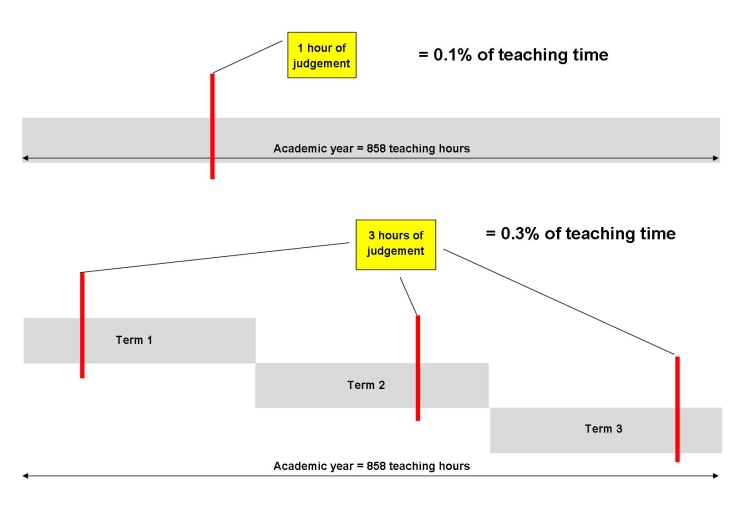It’s been a while since I’ve blogged about leading teaching and learning on a holistic level, and a great deal has changed since my initial post Reshaping Teaching and Learning some 18 months ago. Developing an effective teaching and learning model is comparable to that of honing a finely tuned race car (I’m a Formula 1 fan so that’s the best analogy I can come up with!). Since the inception of our reshaped strategy there have been many incremental changes in our journey at Tavistock College such as book looks, exploring the effectiveness of homework, tweaking professional development and a tight focus on the challenge in learning to name a few. However, I strongly believe that transformational leadership of teaching and learning shouldn’t be a case of “we’ve always done it like that, so why bother to change things” and although incremental evolution works, it will eventually reach a saturation point, a time to change. I’d like to take this opportunity to have a brief rant about using lesson observations to form judgements, for both individual teachers and to assess the quality of teaching overall in a school. Hopefully this rudimentary diagram will exemplify:
“Developing an effective teaching and learning model is comparable to that of honing a finely tuned race car”
I’ve based this upon a main scale teaching load of 44 lessons per fortnight, but I realise there are many variations to the frequency and length of observations that schools wish to undertake and in some cases force upon teachers. It drives me nuts when I continue to hear that schools are not only grading lesson observations, which in itself is ridiculous, but also basing critical judgements around whole school teaching and learning from the mean percentage from either termly or annual cycles. This is flawed and pointless, STOP doing it! I do however advocate using observations to develop pedagogy and this is where they are exceptionally valuable, you can read more about my philosophy on this here ‘Sharing is Caring’. I’d like to point out that teaching and learning and CPD are not mutually exclusive, this is simply common sense, so why observe a lesson to form a judgement around teaching and learning at all?
The Big Picture – over time
The current pace and rate of change in education is palpable and with no sign of any let up, teachers stress levels have never been higher, you only need to speak to colleagues or read recent tabloid headlines to realise this. So then, the big challenge for school leaders is how to realistically and effectively lead teaching and learning, stripping it back to its basic elements and not turning it into a box ticking exercise with unnecessary bureaucratic paperwork. This is absolutely any school’s core business and evolving it logically whilst at the same time being cautious not to add to teacher workload, and therefore stress levels, is essential. Culture is also an influential factor to consider here, hence the need to operate just ahead of the curve of a school’s current trajectory. For example, there would have been no point in proposing our latest model for teaching and learning four years ago when we had just moved out of special measures. Teachers were bruised, defensive and not necessarily open to new ways of working, I can absolutely appreciate why. Fast forward to today, Tavistock College is a ‘Good’ school moving at significant pace towards outstanding and the ethos of staff has changed profoundly. Taking this into consideration, how do we measure progress over time? The answer; we regularly look at the big picture and typicality, using triangulation on two levels; macro and micro, not by simply looking at data in isolation, a spreadsheet can only tell you so much and it needs to be set in context. The component parts that come under the microscope are:
- Book looks/work scrutiny (I prefer ‘book looks’ to be developmental and used within a CPD context, whilst a ‘work scrutiny’ is to inform a triangulated judgement)
- Supportive strolls (aka learning walks)
- Student voice
- Staff voice
- Data analysis
- Depth of SoL
- Pupil pursuit(s)
**No judgemental observations** – observations in this situation could be following whole school threads but remain in a developmental context. Peer/coaching and bespoke professional development are in addition to this.
“Culture is an influential factor to consider, hence the need to operate just ahead of the curve of a school’s current trajectory.”
Joined up thinking is critical, and to sustain any significant impact, a dynamic teaching and learning model needs to align with a schools’ improvement plan objectives and values. Furthermore, I believe to truly weave teaching and learning into the DNA of a school this should fully support and inform appraisal, whole school CPD and bespoke development for individual members of staff.
The intention is that this strategy will continue to provide the vehicle allowing effective monitoring and development of teaching and learning at all levels, whilst maintaining a personalised environment for all teachers to develop their practice and that of each others.
Follow @gary_s_king





I would love to come and see this process in action over a course of time! Wow! It is a step in the right direction. Great work you are doing. Sorry — SOL meant S_ _ t out of luck in my day. Here it means…? Your MICRO view is essential. I notice it dovetails precisely with what the College Board looks for in its required AP English teacher syllabus.
Posted by pradlfan | June 25, 2016, 1:24 pm